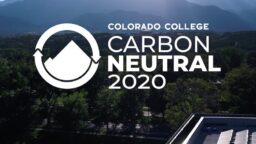Colorado College has successfully achieved carbon neutrality, becoming the first higher-ed institution in the Rocky Mountain region and one of just eight in the United States to do so.
Having set its goal in 2009, the college was able to reach net zero emissions in just over a decade. Since its baseline year, Colorado College has seen a 75 percent reduction in emissions.
To make up for the remaining hard-to-avoid emissions from student commuting, study abroad and wastewater, Colorado College has invested in carbon offset programs away from its campus. For example, the college recently provided funding for a methane destruction project at the Larimer County landfill in northern Colorado.
Engaging in carbon offset programs, like Colorado College does, has become common practice for colleges wishing to claim carbon neutrality, as it’s very difficult at this point for a school to eliminate all campus-related emissions.
Compared to the other seven carbon-neutral colleges, though, Colorado College buys the fewest offsets, according to a recent news release. And that’s something the college takes great pride in.
“This means we’ve done the difficult work of reducing our on-campus emissions first, rather than what some see as ‘buying our way’ to neutrality through offsets,” Ian Johnson, Colorado College director of sustainability, said in the news release.
Colorado College also claims to have achieved carbon neutrality in a scalable and replicable way, meaning nearly any other institution could apply the strategies it deployed to attain carbon neutrality.
In fact, it’s possible that Colorado College faced more barriers than other institutions would, as it is located in Colorado Springs, Colorado, where there are two functioning coal plants and electricity is responsible for a lot of carbon emissions.
“Electricity use in our region generates more carbon emissions than most any other region, making major reductions in our footprint all the more difficult to achieve as our electricity use pushes up emission faster than other institutions,” Johnson said in the news release. “It also means our renewable energy generation and use have bigger impacts on global emissions than in other regions.”
Colorado College’s journey towards carbon neutrality kicked off in 2009, when then-president Richard F. Celeste received a petition supported by roughly two-thirds of its students, encouraging him to sign the American College and University Presidents’ Climate Commitment and fully commit to a 2020 carbon neutrality goal, according to the Denver Post.
Celeste had considered signing the climate commitment when it came out in 2007, but was apprehensive due to a lack of information, according to the news release.
Once committed, however, Colorado College implemented a number of initiatives to make its net-zero carbon goal a reality.
The college worked with the nearby Colorado Springs Utilities to find ways to partner and meet its goals. A student, who happened to be the same person responsible for kickstarting the petition, spearheaded on- and off-campus solar installations. And following an underground geothermal energy project and major renovations, the college’s Tutt Library became the nation’s largest net-zero energy library.
Already, Colorado College has saved more than $6 million from all of its sustainability projects, according to the Denver Post.
And the college is not done. Jill Tiefenthaler, the president, and the Board of Trustees have put together a climate change task force to take on a “What’s Next” project, which will look at operations and leadership outside of Colorado College.
“Addressing climate change will take strong, consistent work from institutions of every kind. Colorado College has shown that significant progress in the climate impact of operations is possible in a relatively short period of time, and we are committed to showing that can be done in other sectors as well,” Alan Townsend, Colorado College provost who has been tasked to lead the “What’s Next” project, said in the news release.
The other seven colleges that have achieved carbon neutrality are: American University in Washington, D.C.; Colgate University in New York; Middlebury College in Vermont; the University of San Francisco; Bowdoin College, Bates College and Colby College, which are all in Maine.



